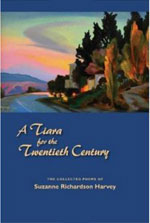
Write what is hardest to say, my poetry instructor in grad school used to urge us, and Suzanne Richardson Harvey does precisely that. In A Tiara for the Twentieth Century: The Collected Poems of Suzanne Richardson Harvey, the poet tackles subjects ranging from motherhood, family relationships and aging to bulimia, AIDS and homelessness.
Whether approaching a big issue (such as the aftermath of Chernobyl in “The Wheat Fields of Chernobyl”) or celebrating small marital moments (in “The Merits of Dining at Home”), her phenomenal word choice enables her to find the music in language. Take, for example, these lines from “Delivery Room”:
My body is a canvas stretched
To catch a falling wing walker
Pulsing like a tom-tom in some obscure and distant jungle
While a free verse poem, there is nonetheless an almost implicit meter: the insistent beat of these lines mimics the rhythmic stages of birth.
Harvey makes skillful use of poetic techniques, such as repetition, in “The Year of Gambler’s Anonymous”:
Love was 20
You could rest your heart in that
Love was a pair of 8’s
You could carve in two
Love was 11
You could mold that into magic.
Through this repetition, she captures the compulsion which drives the central character of the poem.
Such deft choices contribute to this collection’s success. Rather than taking easy outs of lapsing into abstracts, Harvey meets each subject head on, distilling it into essential moments and imagery. In each case, she finds the language to communicate truths in a powerful, specific and often tactile way.
In “Confronting AIDS,” she takes a personal approach to this devastating disease, acknowledging the impact it’s had on society and the investment many people have in finding a cure:
Those crippled cells you can’t claim alone
They’re lodged in the chambers of my heart
Where labels like syndrome and sarcoma
Are blank as a forgotten Christmas tag.
With this collection, Harvey, whose work has appeared in Wild Violet, has indeed crafted a tiara, a delicate coronet crafted from years of skillful, intuitive use of language.
Rating: **** (4 out of 4, Must Read)
Fithian Press, 2009; ISBN: 978-1-56474-489-0
Disclosure: A review copy of the book was provided by the publisher.

